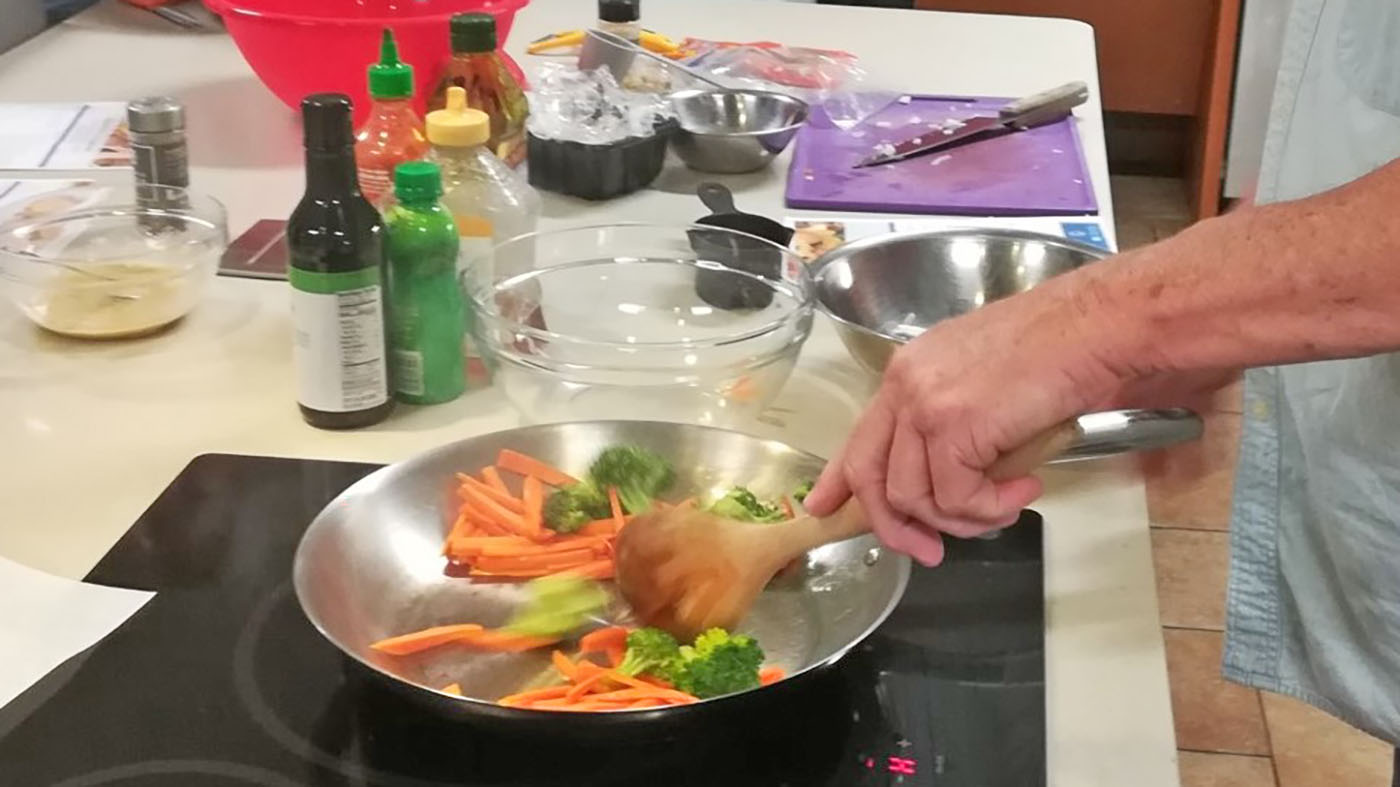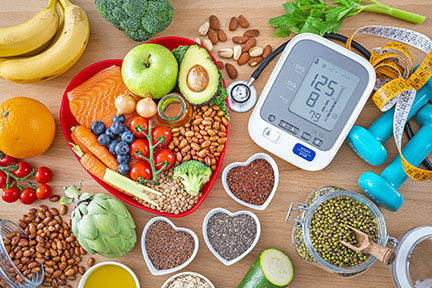Chronic Kidney Disease (CKD), a condition where kidney damage occurs slowly over many years, is the quickest-growing noncontagious disease in the U.S.
CKD rates are higher among Veterans than the general population. The percentage of Veterans with kidney disease is about 34% higher than the general population and cases often go unnoticed as the disease can have no symptoms.
VA provides care to an estimated 600,000 Veterans with CKD, and it offers lifestyle and nutrition programs to help slow the disease and prevent complications. The result of uncontrolled CKD is the need for dialysis or a kidney transplant.
Inspired by VA’s MOVE! Weight Management Program and Healthy Teaching Kitchens, Rebecca Schlueter, registered dietitian, along with a team of other dietitians, started Healthier Kidneys Through Your Kitchen (HKTYK). HKTYK is a prevention-based practice designed to provide Veterans with the knowledge and skills to take control of their kidney health.
“I’ve always had a passion for prevention-based care. If we can get on the front end and inform and inspire others, it helps them take charge of their health and life,” said Schlueter.
Bridging the knowledge gap
Offering access to VA dietitians in a virtual or in-person setting, HKTYK offers a specific type of medical nutrition therapy for kidney disease that encourages Veterans to manage their blood sugar and blood pressure to slow the progression of Chronic Kidney Disease.
Veterans learn about healthy cooking methods, recipes, ways to incorporate movement in their days and how to advocate for themselves at appointments to ensure they fully understand their health. Veterans are encouraged to meet with a dietitian to review individual lab results and partner in goal setting using behavior change therapy.
“It is wonderful to see the Healthier Kidneys Through Your Kitchen Program reaching this special population of Veterans who could benefit from learning nutrition and food preparation skills specifically for their renal health and overall well-being,” said Dr. Anne Utech, national director for VA Nutrition and Food Services.
Harnessing the impact of nutrition
HKTYK has helped over 1,000 Veterans with CKD regain control of their health. Post class evaluations have shown improvements in Veteran knowledge of CKD. Since the creation of HKTYK, Lexington VA has seen a 28% increase in the number of Veterans who receive nutrition intervention from a registered dietitian.
“The quantity and quality of the resources was extraordinary. I really liked that we were given the opportunity to participate and interact,” said one Veteran from the Caribbean VA who participated in the program.
According to the class evaluation survey, 98% of participating Veterans would recommend the program to others with or at risk of kidney disease. This feedback gave the HKTYK team the confidence to spread their practice to more VA facilities.
With support from VHA Innovators Network in 2017 and Diffusion of Excellence as a 2019 VHA Shark Tank Competition winner, HKTYK is available at 21 VA facilities with another 12 VA facilities coming soon.
Dietitians are available at all sites for medical nutrition therapy sessions on a variety of conditions—including CKD. No formal referral or consult is required. Veterans can meet with dietitians in-person or virtually.
Learn more
If you are a Veteran interested in HKTYK, talk to your VA primary care provider or registered dietitian, and explore VA’s eKidney website. To learn more about HKTYK’s innovation journey, view the Diffusion Marketplace page.
Want to learn more about innovation at VA? Visit our website, Diffusion Marketplace, subscribe to our weekly newsletter and explore VA Pathfinder to learn more about our opportunities.
Topics in this story
Link Disclaimer
This page includes links to other websites outside our control and jurisdiction. VA is not responsible for the privacy practices or the content of non-VA Web sites. We encourage you to review the privacy policy or terms and conditions of those sites to fully understand what information is collected and how it is used.
More Stories
Study underscores important role COVID vaccination can have in protecting Veterans from infection and reducing long-term health consequences
Columbia VA’s robotic surgery teams completed their 800th robotic surgery and are on schedule to hit 1,000 by the end of the year.
In a decentralized clinical trial, Veterans can participate from their own homes or local VA instead of having to travel to a research site.








I’m a retired Sergeant Major from USA, my wife’s kidneys has failed 3yrs ago. I received a phone call on a Saturday morning to take her to the emergency room . She was excepted and had a lot of tests done, went to Dialysis 1.5 hrs away. I did not like what I saw and requested a new clinic. At the new clinic I was asked if I would be interested to due the dialysis at home. I took the required training and managed the process at home. Every Nite at 7pm I had set up the computer and connected her for the dialysis process at 0530 the computer had shut off and completed another day. Every month she had blood work done in the six month we went to the kidney doctor for our reviews on the blood work. Her kidneys were functioning at 25% and she came off the dialysis . I was asked to notify her surgeon to remove her catheter. The surgeon was confused however we met on thur. to remove the catheter and the surgeon replied that this was 1 in a million of a success. There is hope for everyone, failure is not a option
That is fantastic news, thank you for sharing.
My recent blood tests resulted in very serious complications to being a candidate for kidney transfusion in the near future. I am very concerned and would appreciate information on this as soon as possible! Thank you!
Getting the care you need is important to us. As a first step, we recommend speaking to your VA PACT clinicians Patient Aligned Care Team (PACT) – Patient Care Services (va.gov) – https://www.patientcare.va.gov/primarycare/PACT.asp. They will work with you to ensure your concerns are addressed in a timely manner. You could consider requesting referral to nephrology if not already established.
Well, I can’t believe this article left me hanging. Wondering what is kidney disease and if I should be tested, since I guess there are no symptoms to cdk.
It’s nice to know that there is a program, but how do I know if it applies to me?
We recommend connecting with your VA PACT clinicians Patient Aligned Care Team (PACT) – Patient Care Services (va.gov) https://www.patientcare.va.gov/primarycare/PACT.asp and asking specifically about your risk of Chronic Kidney Disease. They will work with you to ensure your concerns are addressed by reviewing relevant lab work. You could consider sending a secure message asking about this. You can also ask specifically to have your kidney function tested and obtain bloodwork from your Primary Care Clinician.
Also, you could check out the AHRQ QuestionBuilder app in the VA Mobile App Store. This app helps users prepare for medical visits and get the most from their appointments by walking through questions they might ask or be asked by a medical provider. Users can add appointment information to an e-calendar and send details to a personal email account. You can find the app at AHRQ QuestionBuilder | VA Mobile: https://mobile.va.gov/app/ahrq-questionbuilder